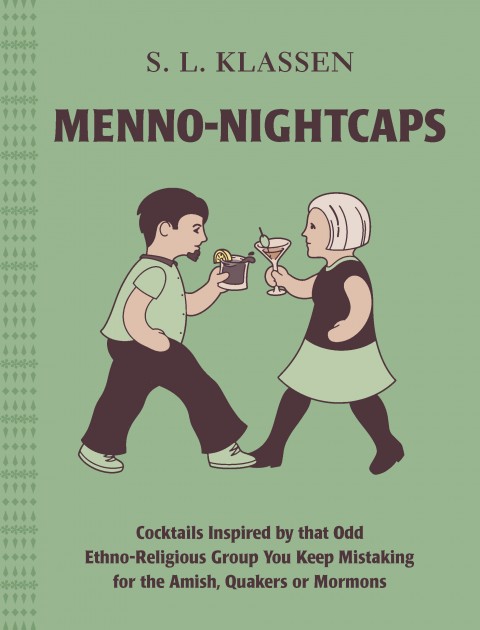 I have noticed a sad lack of Mennonite representation in dystopian literature and cinema. Apart from a couple of cameos in the zombie apocalypse genre, we actually seem to be entirely absent from the world’s terrifying visions of the future. Perhaps the dystopian thinkers imagine that we’ll all just die off in a plague or something before the real dystopia sets in. Or maybe we’re always just a little off camera.
I have noticed a sad lack of Mennonite representation in dystopian literature and cinema. Apart from a couple of cameos in the zombie apocalypse genre, we actually seem to be entirely absent from the world’s terrifying visions of the future. Perhaps the dystopian thinkers imagine that we’ll all just die off in a plague or something before the real dystopia sets in. Or maybe we’re always just a little off camera.
Like many others, I have been watching the new Hulu series based on Margaret Atwood’s novel, The Handmaid’s Tale. The series, like the novel before it, does nothing to rectify the lack of Mennonite representation in the genre. (Sorry if that’s a spoiler for any of you – more spoilers to follow). I know we’re not alone there. Not a lot of religious traditions get their fair share of screen time in the dystopia genre. The Handmaid’s Tale gets a little closer to a Mennonite dystopia than the likes of Robocop or The Hunger Games in that religion is present and plays a driving role of series’ plot. So thanks for that.
Anyway. It’s probably just as well. To be honest, I’m not sure if the world is ready for a series that portrays a true and frighteningly Mennonite possible future.
Fertility as Destiny
To be clear, when I say that The Handmaid’s Tale doesn’t represent us, I’m not saying that there aren’t any resonances. For one thing, we’re pretty keen on fertility, too. Remember that scene in episode 6 when the children run out and frolic in the middle of a dinner party and everyone cranes their necks to watch them? Yeah. They could have shot that film in a Mennonite morning service when all the children run forward for the Children’s Story.
And another thing: we all applaud when someone announces a pregnancy in Sharing Time, greeting the news of a pregnancy with every bit as much enthusiasm as the people of Gilead. We do that even without a worldwide fertility crisis.
But, unlike Commander Waterford, Mennos don’t say that having a baby is a woman’s whole purpose. It’s important, yes, but there’s also Church work, quilting and putting down preserves for the winter.
Community Values
I will also concede that, were there really a massive fertility crisis, and Mennonites were somehow in charge, we would probably all get behind the idea of placing the young fertile women in the homes of families who could be good role models. We’d frame that as positive mentorship and I’d expect a little more condescending niceness on the part of the wives. But as an overall concept, it’s not too far off.
For a truly Mennonite dystopia, however, there’d need to be more evidence of a community spirit. In The Handmaid’s Tale, the Handmaids socialize with each other and pretty much no one else.
Mennonites would never let that happen.
Those poor Handmaids would be attending mixers where they could meet with “good” influences. Also, there’s no way we’d allow just a solitary Aunt to take on the Handmaids’ full education. We’d be shipping off those young women to social, worship and service activities on a regular basis. I notice a remarkable lack of potlucks, intergenerational talent nights, hymn sings, and Bible study sessions.
Seriously, why aren’t there Bible groups? I get that the “study” thing might be problematic but I’m sure we could get around that.
Biblical Hermeneutics
Despite the lack of Bible study groups (and worship services for that matter), the Bible does get a lot of airplay in The Handmaid’s Tale. The Old Testament justifies the concubinage and the harsh physical punishments and the New Testament justifies submission.
I won’t bother making the case that Mennonites don’t read the Bible the same way that the rulers of Gilead did. Given all our subsects, I don’t know, it’s possible that some of us do.
I did like that they quoted some of our favorite bits. The Handmaid’s Tale establishment referenced the Beatitudes not once but twice in the first season, with our heroine also mouthing back by citing another part of the sermon in episode 3. We love the Sermon on the Mount and a Mennonite dystopia would definitely feature a fair bit of Beatitude citing. Our favorite bit is “blessed are the peacemakers” so it’s a bit disappointing that they only covered “the meek,” “those who suffer for the cause of righteousness,” and “those who mourn.” But the series has been renewed so I’m holding out hope that they’ll get to the peacemakers in season 2.
One thing we don’t do, however, is name our places things like “Gilead.” There might be exceptions* to this, but in my own experience, though we’ll happily sing songs about Biblical geography, we’re likelier to name our dystopias something like New Neustadt or The First Mennonite new world order. Or maybe, to avoid turning off the non-ethnic dystopian converts, simply The Kindred.
Decision-making
In episode 8, we finally get a bit of answer to the question that has been plaguing all viewers familiar with Church politics:
How did they manage to get that weird sex ceremony through the congregational and/or confessional decision-making process?
In the television series, two guys just thought that whole thing up in the back of a car one day.
Really?
Before this episode, I didn’t think the ceremony impossible but I imagined that it would come about as a result of a series of bizarre compromises. There would be people advocating for using IVF or more conventional medically-assisted forms of surrogacy. There would be people objecting to the damage done to the institution of marriage. Some would postulate that the “bearing on my knees” bit was simply a bad translation of the original text and go on lengthy discussions about the provenance of the Biblical texts. There would be questions about whether the Bible readings could be varied from one month to the next.
In short, this would take time. There would be a lot of debate on the convention floor. And a lot of letters to the editor of the Gilead re-creation of the Mennonite newspapers. Though Mennonites aren’t all that keen on talking about sex, we would still have a very lengthy discernment process before we’d come up with something like that.
I’m not saying that it couldn’t happen. In fact, if it were to come down to IVF vs creepy sex ritual, it’s possible that the sex ritual would win out in the end. After all, IVF is crazy expensive. And who has that kind of money?
The Aesthetics
With make-up gone, women’s hair all grown long, and modest female attire de rigueur, the aesthetics of the show might have gone Mennonite. Not my kind of Mennonite. You know what I mean. The not-very-sexy kind of Mennonite that I’ve talked about elsewhere. Those shapeless dresses could have been cape dresses instead of dresses with capes. The Marthas’ kerchiefs could have been a little more Old Colony.
But it’s not a Mennonite aesthetic. And that’s not just because of the cut of the cloth and the shape of the head coverings. It’s all those amazing colours! We all learned earlier this year that TV can do lovely things with a Mennonite palette of colours. But it can’t do this. Despite the horror of the dystopia presented, the show is still a feast for the eyes with rivers of the richest of reds and royalest of blues. Even those of us who dress to the standards of “the world” shy away from such bold hues as prideful and a little too fashionable.
It is true that the Aunts wear brown and the Marthas wear a dun green, but the Aunts get to wear glorious great coats that are way too militaristic for a self-respecting Mennonite indoctinator. And if all of us were stuck being Marthas, well, we’re back to playing the bit parts in history again.
So, no. Were this a Mennonite dystopia, those Handmaids and those wives would be all a little more subdued in their fashions.
The Resistance
In every dystopia, of course, the viewer wants to associate with the resistance rather than the regime. And Mennonite viewers are no different. The TV series tells the story of a young woman evolving from passive to resistant in an authoritarian state that wields the Bible like a sword.
But Offred and Nick aren’t anti-Christians in the TV series. Both of them know their Bible well enough to know when it is being misquoted or taken out of context. It would be lovely to imagine them as Mennonite heroes. Offred’s act of non-violent rebellion in episode 10 is just the kind of civil disobedience we’d all like to get behind. Perhaps in season 2, Nick will seal his fate by turning back to help his persecutor.
But, given our history, it’s a little likelier that we really are just a little off camera. As soon as the regime changed, we’d become busy negotiating to keep our privileges and arguing among ourselves whether using a Church as a sanctuary space would put us too much at risk.
That’s for the Mennonites actually in Gilead. Those of us in Canada would shake our heads sadly and take in the refugees.
Offred in a Cape Dress

There already exists a Maragrita Atwood but for this cocktail, I am just going to imagine Offred a little more Mennonite. Because she ordered a Manhattan in Jezebels, I’ve made this one with a whiskey base. It’s sweeter than a Manhattan, giving a hint of the bumbleberry pie so favoured at our tables and relief sales. Just drink a negroni if you want something to capture the bitterness of a dystopia.
2 oz whiskey
1/2 oz chambord or another berry liqueur
3 dashes of orange bitters
Stir the drink over ice and serve with a maraschino cherry.
*note that this particular exception was named after a place named by various non-Mennonites. So, it’s not our fault.




For Amish/Mennonite dystopian literature try The Long Tomorrow by Leigh Brackett. The Amish, aka New Order Mennonites, rule North America after the apocalypse.
So I guess I should amend that first line to ALMOST entirely absent.
Hagseed by Margaret Atwood has a Mennonite character. It’s set in a jail, so he’s a drug smuggler nicknamed Krampus the Mennonite.
No explanation as to how he got the nickname.
The Amish are mentioned in passing in Julian Comstock: A Story of 22nd Century America.
It’s a post apocalyptic steampunk novel, where America and most of Canada is run by Fundamentalist Christians.
Oh, and I nearly forgot, back in the late 80’s, the War of the Worlds TV series planned on having the aliens take over Amish people and then take over the world. I know someone who was working at The Meeting Place in St. Jacobs when someone from the production company came in to inquire about possibly renting an Amish farm.
In the end, the Aliens took over some people running a communal farm instead. Not Hutterites, though.